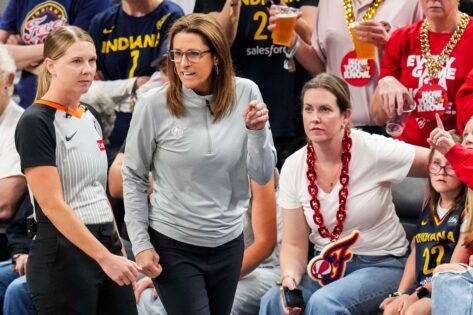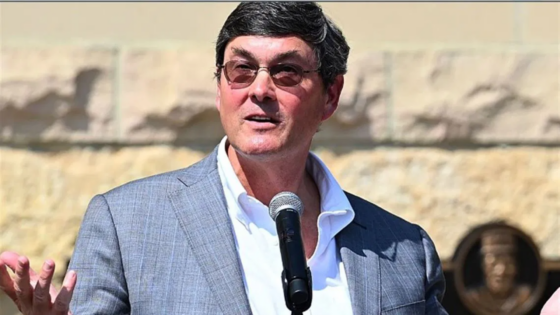AI Cathy Engelbert is already “making changes” with $180 pay offers and Taco Bell vouchers, but in satire, not reality.
The real WNBA hasn’t said a word following the Fever-Sun Commissioner’s Cup melee.
Meanwhile, Indiana head coach Stephanie White has been doing everything short of shaking the league office doors herself.
And she’s not holding back.
“Bad officiating is bad officiating,” White said plainly. The rest of her story? It’s worse than you think.
When asked after the postgame press conference if the Indiana Fever as a franchise were actively trying to address officiating issues with the league, Stephanie White didn’t dodge.
“Yeah, I mean, I think every year when we have our league meetings in the fall and in the spring, we say the same thing over and over and over, and nothing has changed. So, you know, I’m not sure outside of continuing to submit clips, continuing to talk about it,” White admitted.
It’s not a new play out of the Indiana playbook. But as of 2025, the urgency has spiked—and not just because of a few missed calls. White is watching the Fever’s future stars get roughed up with no remedy in sight.
Last season, Caitlin Clark led the league in being targeted by flagrant fouls; 6 of the 34 called across the WNBA in 2024 were committed against her. That’s nearly 18% of all flagrants aimed at a single player, per Vaughn Hajra’s breakdown on Stat Surge. Second on the list? Sophie Cunningham—with three. Ironically, they’re now teammates.
That’s why Stephanie White’s frustration has turned public—and costly.
On May 24, after a last-second 90–88 loss to the Liberty, White used the very first question of the press conference to voice what had been boiling beneath the surface.
“I thought (Clark) got fouled,” she said, referring to a no-call on Natasha Cloud during the final play.
“I think it’s pretty egregious what’s been happening to us these last few games,” White continued. “A minus-31 free-throw discrepancy (over three games)—I might be able to understand that if we’re chucking 3s, but we’re not. We’re attacking the rim. The disrespect right now for our team has been pretty unbelievable.”
That honesty cost her. The WNBA fined White, undisclosed amount for her comments. And the next press conference? She joked with a reporter:
“Do you want me to get fined again? Because I did just get fined.”
Indiana Fever HC isn’t the only one speaking out; officiating concerns are echoing across the entire WNBA.
But she’s not alone on this island. Just days after Indiana’s loss, Kelsey Plum went off following the Aces’ 89–81 loss to the Valkyries.
“I’ll get fined for that and that’s fine… but they’re fouling the f— out of me every single play,” Plum said. “So I’m very frustrated with that and I’m sick of it. I don’t know what I need to do. I talk to the ref nice, I pray before the game. I’m over it.”
Even elite coaches like Becky Hammon have pointed out the blurry lines between physical play and dangerous play, flagging a bigger structural issue: what even qualifies as a flagrant anymore?
Indiana Fever forward Aliyah Boston (7) celebrates with Indiana Fever guard Caitlin Clark (22) altering recording a triple-double Wednesday, Sept. 4, 2024, during the game at Gainbridge Fieldhouse in Indianapolis. The Indiana Fever defeated the Los Angeles Sparks, 93-86.
No one knows, but now that the league is only responding with fines and silence, and fans are busy cooking up AI-generated Cathy Engelberts with Taco Bell vouchers and $180 bonuses, it might be worth turning our attention to a different conversation.
Specifically, an article by SB Nation discussed on a podcast by Rachel DeMita, which features an interview with Monty McCutchen and Sue Blauch.
For context, McCutchen is the NBA’s Senior Vice President of Referee Development and Training, a former NBA referee of nearly 25 years. Blauch, now VP of WNBA Referee Performance and Development, officiated in the league for two decades.
But here’s the kicker: when asked about criticisms from fans and players over excessive physicality in the modern WNBA and the need to better protect athletes from hard fouls, McCutchen passed the ball elsewhere:
“I think sometimes it’s misunderstood that referees make those decisions about the style of play and the interpretations of rules,” McCutchen said. “That’s not true. What actually happens is that we have a competition committee for stakeholders, coaches, governors, and general managers — and that competition committee is the committee that dictates the state of the game.”
So the stakeholders dictate the state of physicality in the W? That’s a very slippery slope.
And it’s even more frustrating when you consider what happened in the recent Indiana Fever vs. Connecticut Sun game. During the third quarter, Caitlin Clark was shoved hard by Marina Mabrey. The play was reviewed. Even ESPN’s Michael Voepel and other commentators expected an ejection.
Instead?
“The contact made by Mabrey did not rise to the level of an ejection,” said crew chief Ashley Gloss, via a post-game pool report to the Indy Star’s Chloe Peterson. “Additionally, [it] did not meet the criteria for a flagrant foul penalty two.”
That left many shaking their heads—not just fans, but players, coaches, and media figures across the board. With such moments piling up, the league’s insistence on downplaying or quietly shelving them feels more like a strategy than a stumble.
The post Indiana Fever HC Reveals Grim Truth From Franchise Meetings After Losing Faith in WNBA Officiating appeared first on EssentiallySports.



